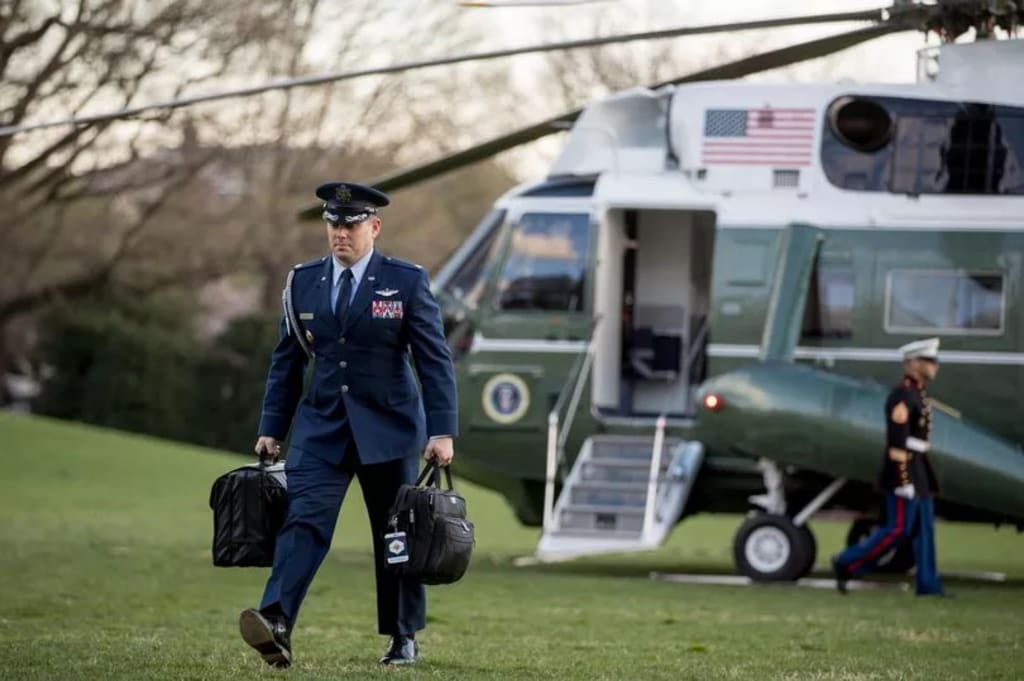Nuclear Football
Secrets of the 'nuclear football' briefcase - and the 'ultimate danger' it poses

A 'nuclear briefcase' carried by the presidents shows the 'ultimate danger' of war according to one expert who believes the 'secrecy' of the briefcase is 'a problem' for public appearances. A nuclear briefcase handed from president to president could show the "ultimate danger" of the warhead and the potential for it to be fired.
The so-called "nuclear football" is carried by a member of the military service and follows the president wherever he is with a bulky briefcase.
Inside are codes and orders which would confirm a transmission to the Pentagon, who in turn would relay an order to fire nuclear missiles at whoever or whatever the target may be.
An expert has since revealed the use of the so-called "nuclear football" and what it means for the future of nuclear warfare, should the devastating occasion arise.Little is known about the satchel, but what is known is its importance to the sitting president, who is usually spotted near to the briefcase and its atomic potential.
William Burr, a senior analyst at the National Security Archive, says the football cannot be fully explained due to reasons of "secrecy" and "nuclear risk".
He said: "The explanation is the secrecy and the problem of nuclear risk and danger.
"The idea of a military aide following the president, carrying a locked bag with secret nuclear information, is a routine for the modern U.S presidency that has intrigued journalists and historians and the public."The idea that the president needs to be able to make speedy decisions in a perilous moment conveyed the ultimate danger of nuclear weapons. That the football system has lasted since the late 1950s adds to the mystery."
Sitting presidents are not the only people who carry a "nuclear football" with them, as the Daily Star previously reported Russian president Vladimir Putin had his very own briefcase full of nuclear codes.His attendance at Vladimir Zhrinozsky funeral raised a few eyebrows when people saw the box full of nuclear launch codes.
No armed guards were present at the funeral, but codes to devastating nuclear missiles were.
The nuclear football, formally known as the Presidential Emergency Satchel, is a briefcase that accompanies the President of the United States wherever they go. It contains communication tools and authentication codes that the President could use to initiate a nuclear strike. While the nuclear football serves as a crucial tool for national defense, it also poses potential dangers that warrant careful consideration:
Accidental or Unauthorized Access: The nuclear football is a highly sensitive and classified item. If it were to fall into the wrong hands, either accidentally or through unauthorized access, it could lead to catastrophic consequences. Adequate security protocols and constant vigilance are essential to prevent any such incidents.
Miscommunication or False Alarm: In a tense and high-pressure environment, there is always the risk of miscommunication or false alarms. An erroneous signal or misunderstanding during a crisis could potentially lead to the initiation of a nuclear strike, even if it was not intended.
Psychological and Emotional Burden: The responsibility of carrying the nuclear football is an immense psychological and emotional burden for the President and the designated military aide responsible for its safekeeping. The knowledge that a single decision could alter the course of history and lead to devastating consequences is an unparalleled weight to bear.
Preemption Dilemma: The nuclear football is meant to provide the United States with a credible deterrent against potential adversaries. However, its existence also raises concerns about preemptive strikes. If there were indications of an imminent attack, the President might face an agonizing decision to initiate a nuclear response, potentially escalating tensions and leading to a nuclear exchange.
Diplomatic Challenges: The presence of the nuclear football can complicate diplomatic efforts, particularly during sensitive negotiations or international conflicts. The knowledge that the President holds the power of nuclear weapons could strain diplomatic relations and create further distrust among nations.
Technological Vulnerabilities: As with any technology, the nuclear football is not immune to vulnerabilities. Cybersecurity threats and hacking attempts pose risks of compromising the sensitive information contained within the briefcase.
Accidental Launch: While modern nuclear safeguards have multiple layers of authentication to prevent accidental launches, the possibility of technical malfunctions or human errors leading to an unintended launch still exists, albeit highly improbable.
Escalation Risks: The use of nuclear weapons carries inherent risks of escalation. A limited nuclear strike could quickly spiral into an all-out nuclear war, leading to catastrophic global consequences.
To mitigate these potential dangers, rigorous training, robust security measures, clear communication protocols, and strict adherence to well-defined procedures are critical. Additionally, open channels of communication between nuclear-armed nations and disarmament efforts play a vital role in reducing the risks associated with the existence of the nuclear football. The objective should be to maintain peace and stability while ensuring the utmost caution and responsibility in dealing with such powerful weaponry.





Comments
There are no comments for this story
Be the first to respond and start the conversation.